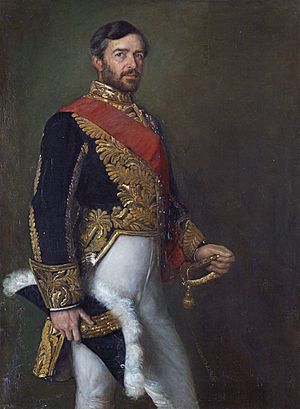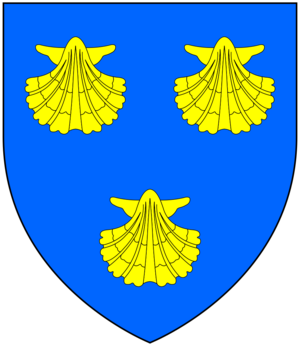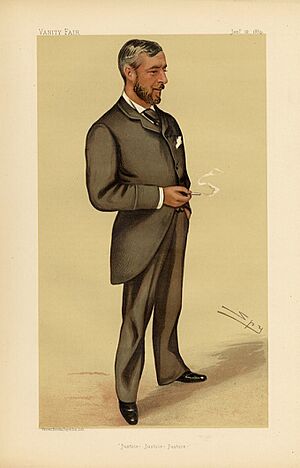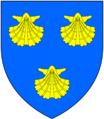Edward Malet facts for kids
Quick facts for kids
Sir Edward Malet, 4th Bt
|
|
|---|---|
 |
|
| Consul-General in Egypt | |
| In office 1879–1883 |
|
| Preceded by | Frank Lascelles |
| Succeeded by | Sir Evelyn Baring |
| Personal details | |
| Born | 10 October 1837 |
| Died | 29 June 1908 (aged 70) |
| Nationality | British |
| Spouse | Ermyntrude Sackville Russell |
| Education | Eton College |
| Occupation | Diplomat |
| Known for | Malet Memorial Hall |
Sir Edward Baldwin Malet, 4th Baronet (born 10 October 1837 – died 29 June 1908) was an important British diplomat. A diplomat is someone who represents their country in other nations. Sir Edward came from a family of diplomats. His father, Sir Alexander Malet, was also a British minister.
Contents
Early Life and Diplomatic Start
Edward Malet went to Eton College for three years. At just 17 years old, he began his career in the foreign service. This meant he started working for the British government in other countries.
He first served as an assistant to his father in Frankfurt, Germany. Later, he worked in Brussels, Belgium. He learned a lot about diplomacy from a famous diplomat named Richard Lyons, 1st Viscount Lyons.
Serving Around the World
Sir Edward Malet worked in many different countries. He was a Secretary of Legation, which is a senior diplomatic role.
Key Diplomatic Posts
- Peking (Beijing), China: 1871–1873
- Athens, Greece: 1873–1875
- Rome, Italy: 1875–1878
- Constantinople (Istanbul), Ottoman Empire: 1878–1879
While in Constantinople, he worked closely with the Ottoman Sultan, Abdul Hamid II. This was during a time when important treaties were being signed.
Role in Egypt
In 1879, Edward Malet was appointed as the Agent and Consul-General in Egypt. This was a very important job. He worked there until 1883.
Reforms and Challenges
Malet pushed for changes in Egypt's government and finances. At first, he supported Ahmed Orabi, who wanted a more constitutional government for Egypt. However, things changed.
After Britain and France sent a joint message to the Egyptian government, Malet's views shifted. He began to support the British government's plans to get involved in Egypt. He sent a telegram that suggested the British government should show its naval power near Alexandria. This event led to the 1882 Anglo-Egyptian War.
Later Career and Personal Life
After his time in Egypt, Sir Edward Malet continued his diplomatic career.
Ambassadorial Roles
- Minister to Belgium: 1883–1884
- Ambassador to the German Empire: 1884–1895
In 1892, he built a large and beautiful villa in France. He named it "Le Chateau Malet."
Family and Legacy
In 1885, Edward Malet married Lady Ermyntrude Sackville Russell. She was the daughter of the Duke of Bedford.
After his death, his wife founded the Malet Memorial Hall in Bexhill-on-Sea in 1912. This building was a church on its upper floor and was built in a Tudor Revival-style. It opened in October 1913.
A street in Bloomsbury, Central London, called Malet Street, was also named in his honor.
Images for kids
 | Madam C. J. Walker |
 | Janet Emerson Bashen |
 | Annie Turnbo Malone |
 | Maggie L. Walker |





